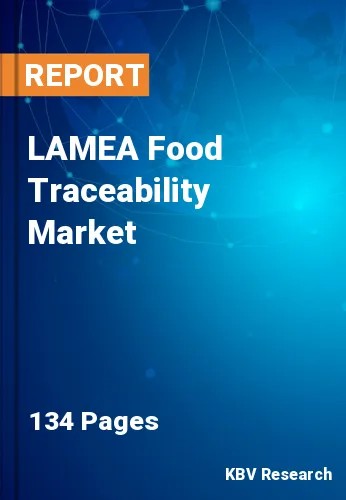The Latin America, Middle East and Africa Food Traceability Market would witness market growth of 10.6% CAGR during the forecast period (2023-2030).
The food industry is undergoing a transformative shift driven by the imperative for increased transparency, safety, and accountability throughout the supply chain. In this changing context, food traceability solutions are essential for businesses to overcome obstacles, comply with strict regulations, and fulfill the growing demands of customers who care more than ever about food origins and safety.
Moreover, adopting food traceability systems represents a paradigm shift in how the food industry approaches supply chain management. Traditionally, the food supply chain has been characterized by complex networks of producers, distributors, retailers, and other stakeholders, each contributing to the journey of products from farm to fork. However, the industry has faced growing challenges related to food safety, quality assurance, and the need to respond swiftly to contamination or recalls.
The increase in meat production in the UAE has heightened consumer expectations regarding the transparency and quality of food products. As consumers become more informed about the safety standards, processing methods, and origin of the meat they consume, they are becoming more conscientious of these factors. It addresses these concerns by providing a transparent record of a product's journey from farm to table. Thus, the growing fish, meat, and seafood sector in the LAMEA region will boost the demand for food traceability in the region.
The China market dominated the Asia Pacific Food Traceability Market by Country in 2022 and would continue to be a dominant market till 2030; thereby, achieving a market value of $2,345.9 million by 2030. The Japan market is experiencing a CAGR of 8.8% during (2023 - 2030). Additionally, The India market would exhibit a CAGR of 10.3% during (2023 - 2030).
Based on Software, the market is segmented into Supply Chain Management (SCM), Enterprise Resources Planning (ERP), Warehouse Software, Laboratory Information Systems, and Others. Based on End-use, the market is segmented into Fish, Meat, & Seafood, Dairy Products, Processed Food, Fruits & Vegetables, Bakery & Confectionary, Fruit Pulp & Concentrates, and Others. Based on Type, the market is segmented into Barcodes, Radio Frequency Identification, Global Positioning Systems, Infrared, Biometrics, and Others. Based on countries, the market is segmented into Brazil, Argentina, UAE, Saudi Arabia, South Africa, Nigeria, and Rest of LAMEA.
Free Valuable Insights: The Worldwide Food Traceability Market is Projected to reach USD 29.4 Billion by 2030, at a CAGR of 9.1%
The market research report covers the analysis of key stakeholders of the market. Key companies profiled in the report include Cognex Corporation, Honeywell International, Inc., SGS S.A., Zebra Technologies Corporation, Carlisle Technology, Bio-Rad Laboratories, Inc., C.H. Robinson Worldwide, Inc., Optel Group, Bar Code Integrators, Inc., and Food Forensics Ltd.
By Software
By End-use
By Type
By Country
Our team of dedicated experts can provide you with attractive expansion opportunities for your business.

